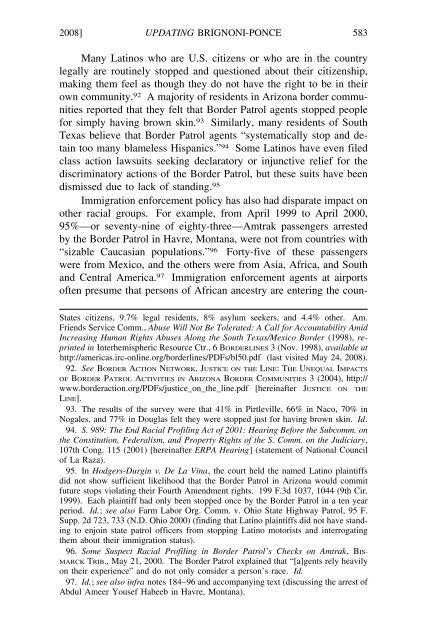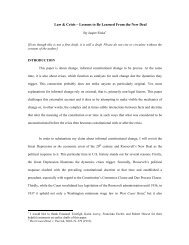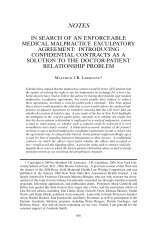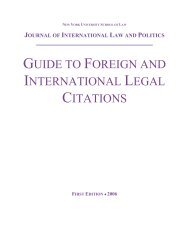updating brignoni-ponce - New York University School of Law
updating brignoni-ponce - New York University School of Law
updating brignoni-ponce - New York University School of Law
You also want an ePaper? Increase the reach of your titles
YUMPU automatically turns print PDFs into web optimized ePapers that Google loves.
2008] UPDATING BRIGNONI-PONCE 583<br />
Many Latinos who are U.S. citizens or who are in the country<br />
legally are routinely stopped and questioned about their citizenship,<br />
making them feel as though they do not have the right to be in their<br />
own community. 92 A majority <strong>of</strong> residents in Arizona border communities<br />
reported that they felt that Border Patrol agents stopped people<br />
for simply having brown skin. 93 Similarly, many residents <strong>of</strong> South<br />
Texas believe that Border Patrol agents “systematically stop and detain<br />
too many blameless Hispanics.” 94 Some Latinos have even filed<br />
class action lawsuits seeking declaratory or injunctive relief for the<br />
discriminatory actions <strong>of</strong> the Border Patrol, but these suits have been<br />
dismissed due to lack <strong>of</strong> standing. 95<br />
Immigration enforcement policy has also had disparate impact on<br />
other racial groups. For example, from April 1999 to April 2000,<br />
95%—or seventy-nine <strong>of</strong> eighty-three—Amtrak passengers arrested<br />
by the Border Patrol in Havre, Montana, were not from countries with<br />
“sizable Caucasian populations.” 96 Forty-five <strong>of</strong> these passengers<br />
were from Mexico, and the others were from Asia, Africa, and South<br />
and Central America. 97 Immigration enforcement agents at airports<br />
<strong>of</strong>ten presume that persons <strong>of</strong> African ancestry are entering the coun-<br />
States citizens, 9.7% legal residents, 8% asylum seekers, and 4.4% other. Am.<br />
Friends Service Comm., Abuse Will Not Be Tolerated: A Call for Accountability Amid<br />
Increasing Human Rights Abuses Along the South Texas/Mexico Border (1998), reprinted<br />
in Interhemispheric Resource Ctr., 6 BORDERLINES 3 (Nov. 1998), available at<br />
http://americas.irc-online.org/borderlines/PDFs/bl50.pdf (last visited May 24, 2008).<br />
92. See BORDER ACTION NETWORK, JUSTICE ON THE LINE: THE UNEQUAL IMPACTS<br />
OF BORDER PATROL ACTIVITIES IN ARIZONA BORDER COMMUNITIES 3 (2004), http://<br />
www.borderaction.org/PDFs/justice_on_the_line.pdf [hereinafter JUSTICE ON THE<br />
LINE].<br />
93. The results <strong>of</strong> the survey were that 41% in Pirtleville, 66% in Naco, 70% in<br />
Nogales, and 77% in Douglas felt they were stopped just for having brown skin. Id.<br />
94. S. 989: The End Racial Pr<strong>of</strong>iling Act <strong>of</strong> 2001: Hearing Before the Subcomm. on<br />
the Constitution, Federalism, and Property Rights <strong>of</strong> the S. Comm. on the Judiciary,<br />
107th Cong. 115 (2001) [hereinafter ERPA Hearing] (statement <strong>of</strong> National Council<br />
<strong>of</strong> La Raza).<br />
95. In Hodgers-Durgin v. De La Vina, the court held the named Latino plaintiffs<br />
did not show sufficient likelihood that the Border Patrol in Arizona would commit<br />
future stops violating their Fourth Amendment rights. 199 F.3d 1037, 1044 (9th Cir.<br />
1999). Each plaintiff had only been stopped once by the Border Patrol in a ten year<br />
period. Id.; see also Farm Labor Org. Comm. v. Ohio State Highway Patrol, 95 F.<br />
Supp. 2d 723, 733 (N.D. Ohio 2000) (finding that Latino plaintiffs did not have standing<br />
to enjoin state patrol <strong>of</strong>ficers from stopping Latino motorists and interrogating<br />
them about their immigration status).<br />
96. Some Suspect Racial Pr<strong>of</strong>iling in Border Patrol’s Checks on Amtrak, BIS-<br />
MARCK TRIB., May 21, 2000. The Border Patrol explained that “[a]gents rely heavily<br />
on their experience” and do not only consider a person’s race. Id.<br />
97. Id.; see also infra notes 184–96 and accompanying text (discussing the arrest <strong>of</strong> R<br />
Abdul Ameer Yousef Habeeb in Havre, Montana).
















